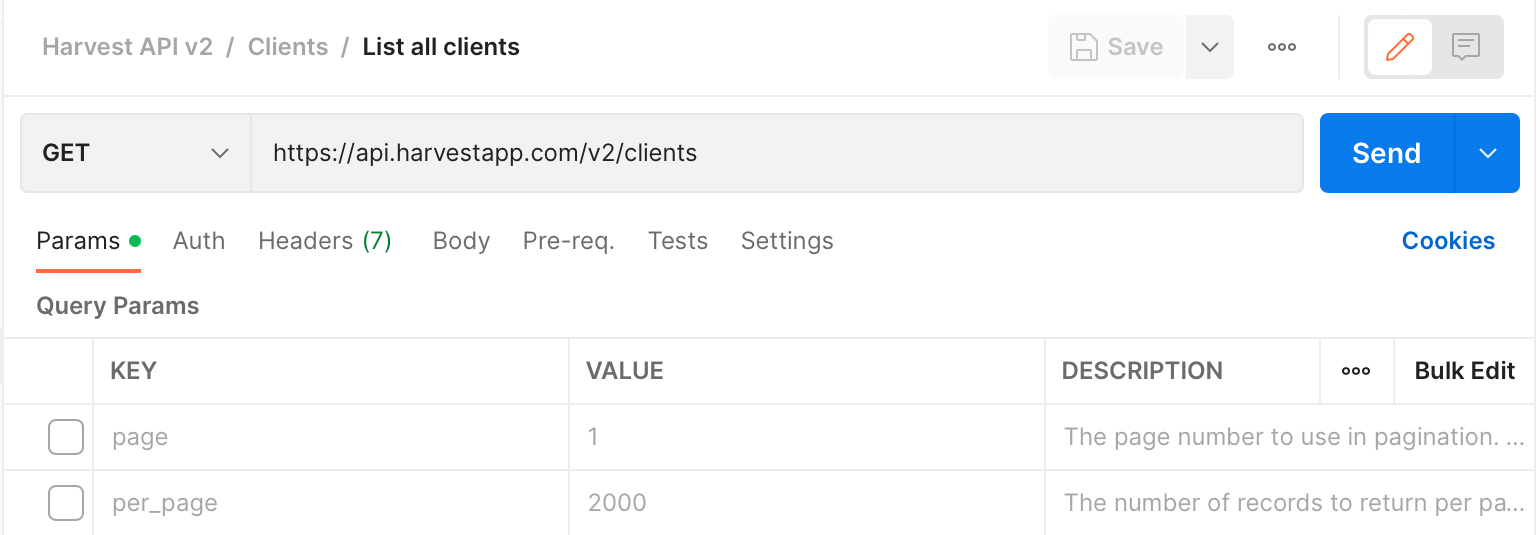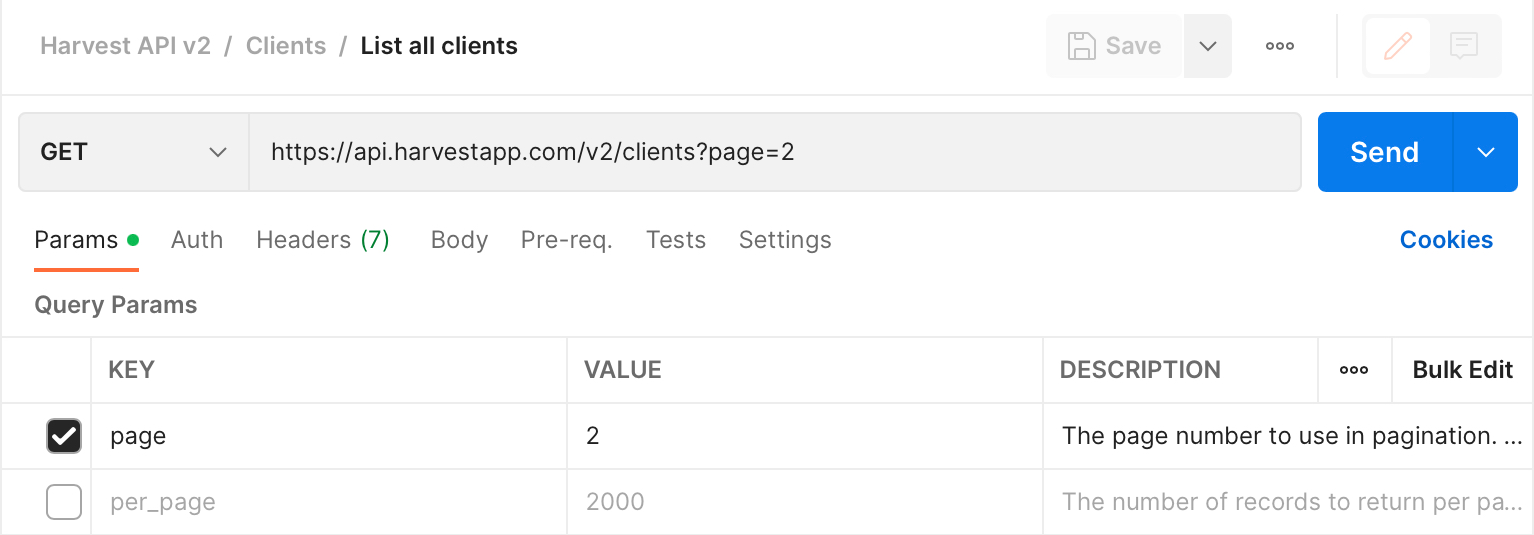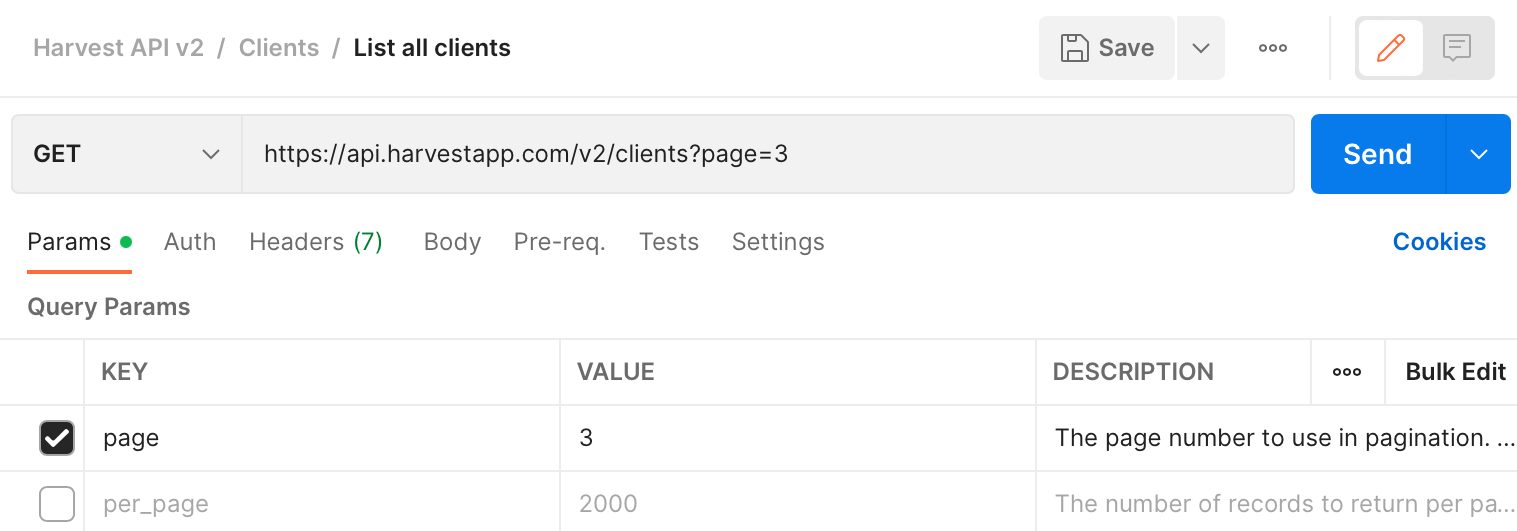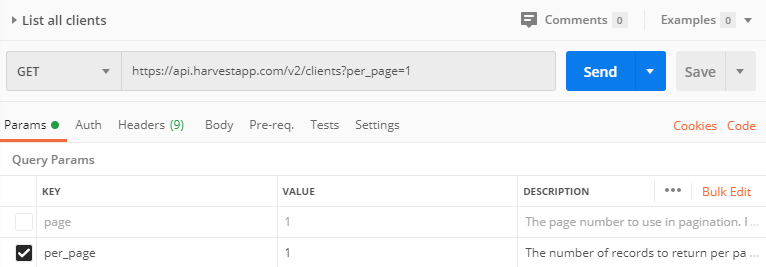Pagination
Most requests that return multiple records are paginated. If a response is paginated, the response will include values for page, total_pages, total_entries, next_page, and previous_page, as well as a section of links with URLs to retrieve the first, next, previous, and last pages of records.
links section of a response instead of constructing pagination links yourself.
Paginated response example
For example, to retrieve the first page of clients, you would make the following request:

curl "https://api.harvestapp.com/v2/clients" \
-H "Authorization: Bearer $ACCESS_TOKEN" \
-H "Harvest-Account-Id: $ACCOUNT_ID" \
-H "User-Agent: MyApp ([email protected])"
Response:
{
"clients": [
"{2000 client objects}"
],
"page": 1,
"total_pages": 3,
"total_entries": 257,
"next_page": 2,
"previous_page": null,
"links": {
"first": "https://api.harvestapp.com/v2/clients?page=1&per_page=2000&ref=first",
"next": "https://api.harvestapp.com/v2/clients?cursor=eyJhZnRlciI6eyJpZCI6MzAwN319&per_page=2000&ref=next_cursor",
"previous": null,
"last": "https://api.harvestapp.com/v2/clients?page=3&per_page=2000&ref=last"
}
}In that response, you can see the included pagination metadata values. To retrieve the next page of clients, use the next URL provided in the links section:

curl "https://api.harvestapp.com/v2/clients?cursor=eyJhZnRlciI6eyJpZCI6MzAwN319&per_page=2000&ref=next_cursor" \
-H "Authorization: Bearer $ACCESS_TOKEN" \
-H "Harvest-Account-Id: $ACCOUNT_ID" \
-H "User-Agent: MyApp ([email protected])"
Response:
{
"clients": [
"{2000 client objects}"
],
"page": 2,
"total_pages": 3,
"total_entries": 257,
"next_page": 2,
"previous_page": 1,
"links": {
"first": "https://api.harvestapp.com/v2/clients?page=1&per_page=2000&ref=first",
"next": "https://api.harvestapp.com/v2/clients?cursor=eyJhZnRlciI6eyJpZCI6NDAwN319&per_page=2000&ref=next_cursor",
"previous": "https://api.harvestapp.com/v2/clients?cursor=eyJiZWZvcmUiOnsiaWQiOjYwMDZ9fQ&per_page=2000&ref=previous_cursor",
"last": "https://api.harvestapp.com/v2/clients?page=3&per_page=2000&ref=last"
}
}To retrieve the final page of clients, use the last URL provided in the links section:

curl "https://api.harvestapp.com/v2/clients?page=3&per_page=2000&ref=last" \
-H "Authorization: Bearer $ACCESS_TOKEN" \
-H "Harvest-Account-Id: $ACCOUNT_ID" \
-H "User-Agent: MyApp ([email protected])"
Response:
{
"clients": [
"{57 client objects}"
],
"page": 3,
"total_pages": 3,
"total_entries": 257,
"next_page": null,
"previous_page": 2,
"links": {
"first": "https://api.harvestapp.com/v2/clients?page=1&per_page=2000&ref=first",
"next": null,
"previous": "https://api.harvestapp.com/v2/clients?page=4&per_page=2000&ref=previous",
"last": "https://api.harvestapp.com/v2/clients?page=3&per_page=2000&ref=last"
}
}Pagination parameters
Paginated endpoints use the following optional parameters:
-
per_page— The number of records to return per page.-
The default and maximum
per_pagevalue for API requests is2000. If you want to receive the maximum number of records per page, do not provide a value — the default is always the maximum number supported. -
If you provide a value for
per_pagethat is too large, you will receive a422 Unprocessable Entityerror code with anInvalid per_page parametererror message.
-
-
pageorcursor— An indicator for which page of records should be returned.-
The
pageandcursorparameters are mutually exclusive and should not be used together. If both are provided,cursorwill take precedence. -
You should always avoid using these parameters directly, and instead rely on the values provided by the
first,next,previous, andlastURLs in thelinkssection of the response. They will dynamically usepageorcursorvalues to maximize performance of the endpoints for you.
-
per_page parameter example
To retrieve fewer records than the maximum page size supported, add the per_page parameter to the URL. For example, to retrieve the most recently created client:

curl "https://api.harvestapp.com/v2/clients?per_page=1" \
-H "Authorization: Bearer $ACCESS_TOKEN" \
-H "Harvest-Account-Id: $ACCOUNT_ID" \
-H "User-Agent: MyApp ([email protected])"
Response:
{
"clients": [
"{1 client object}"
],
"page": 1,
"total_pages": 257,
"total_entries": 257,
"next_page": 2,
"previous_page": null,
"links": {
"first": "https://api.harvestapp.com/v2/clients?page=1&per_page=1&ref=first",
"next": "https://api.harvestapp.com/v2/clients?cursor=eyJhZnRlciI6eyJpZCI6ODAwNX19&per_page=1&ref=next_cursor",
"previous": null,
"last": "https://api.harvestapp.com/v2/clients?page=257&per_page=1&ref=last"
}
}